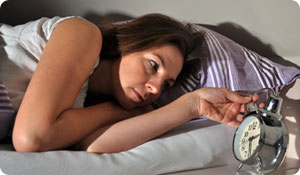
You know how you feel after a restless or sleepless night—grouchy, stressed out, and just plain awful! The longer you go without a good night's sleep, the worse you feel. Here's what you can do to get your sleep habits—and your mood—back on track.
If you often have trouble sleeping, you probably don't need scientific evidence to convince you that insomnia can lead to depression. There's a good chance you're feeling something like it already. But several clinical studies have, in fact, shown that lack of sleep has a profound effect on your mental well-being and that, for some people, chronic insomnia increases the risk of developing a psychological disorder such as depression or anxiety. And if you already suffer from a mood disorder, losing sleep can make it worse.
There are many things you can do, starting right now, that can help improve your mood and also help you get a better night's sleep. Daily exercise and relaxation techniques are at the top of the list, but a warm bath before bedtime can be equally effective.
- Physical activity. According to the University of Maryland Medical Center (MMC) Sleep Disorders Center, routine exercise results in sounder sleep patterns, especially if you work out in the afternoon. You should probably avoid aerobic exercises within two hours of bedtime, but simple stretches just before you go to bed can help relieve tension. Relaxed, focused exercise routines, such as yoga and t'ai chi are a better choice for late-night exercise.
- Relaxation techniques. Deep breathing exercises, progressive relaxation, and toe tensing are a few practices that can help reduce anxiety and relieve physical tension in muscles throughout your body. These techniques help you counter the tension that builds up in your body through the course of a stressful day.
- Deep breathing involves slowly and deeply breathing in through your nose, holding your breath for just a couple of seconds, and slowly releasing the air through your mouth.
- Progressive relaxation is a method of feeling the weight of your individual body parts from head to toes as you lie on your back, and consciously relaxing these areas, one at a time.
- Toe tensing as you lay on your back involves repeatedly tensing your toes by curling them toward your face, holding for a slow count to 10, relaxing your toes and counting slowly to 10 before repeating. According to MMC, toe tensing relaxes the entire body.
You can find more complete instructions for using these methods online, or speak to a holistic health practitioner or certified yoga instructor.
- Warm bath. Take a bath approximately an hour and a half before bedtime, and you may find it easier to fall asleep and enjoy more restful sleep throughout the night. Soaking in a warm bath is relaxing and it raises your body temperature. After you get out of the tub and your body cools down, the change in temperature is a signal to your brain that it's time to go to sleep.
If you suffer from insomnia, depression, or both, and these lifestyle changes don't help, it may be time to see a professional. Your doctor can prescribe a sleeping pill, antidepressant, or medication that can help relieve your symptoms of depression and help you sleep. You may also benefit from seeing a psychotherapist for talk therapy and additional guidance in following relaxation techniques.
Sources:
Breslau, N. "Sleep Disturbance and Psychiatric Disorders: A :longitudinal Epidemiological Study of Young Adults" Biological Psychiatry 15 Mar 1996 39(6):411-418 Web 19 Oct 2011
http://www.sciencedirect.com/science/article/pii/0006322395001883
Harvard Medical School Division of Sleep Medicine: Sleep and Mood
http://healthysleep.med.harvard.edu/need-sleep/whats-in-it-for-you/mood
Neckelmann, D et al. "Chronic Insomnia as a risk Factor for Developing Anxiety and Depression" Sleep 2007 30(07) 873-880 Web 19 Oct 2011
http://www.journalsleep.org/ViewAbstract.aspx?pid=26880
University of Maryland Medical Center Sleep Disorders Center: Sleep Hygiene
http://www.umm.edu/sleep/sleep_hyg.htm
University of Maryland Medical Center Sleep Disorders Center: Relaxation Techniques
http://www.umm.edu/sleep/relax_tech.htm





